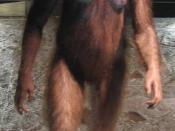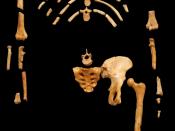There are many advantages that come with living in groups for primates, and there are many views on them as well. Richard Wrangham believes that primates live in groups the way they do because it lets them defend access to valuable and limited resources (food). This view proves true since it is also true that larger groups defeat the smaller groups in confrontations over resources, but it does not take into account tradeoffs, explain social organization, or offer evidence that females would benefit from living in larger groups. Carl van Shaik's predation model claims that the main benefit of grouping is in protection from predators. And while it is true that ground groups may be larger than arboreal ones because terrestrial life is more dangerous, actual acts of predation are rarely witnessed so it cannot be said for sure. Also, the model doesn't hold for social organization, habitat use, and predation pressure.
Group size varies from specie to specie, so it is hard to define the best size but studies on different groups have shown that terrestrial primates usually live in larger groups; that frugivores live in larger groups than folivores; and diurnal species in larger groups than nocturnal. According to both social models, females would form important long-term cooperative bonds in units known as female-bonded kin groups, and philopatry is common in most nonmonogamous, gregarious primate species. The distribution of males is determined by the distribution of the females, but males will avoid mating with related females to prevent inbreeding.
Sociobiology is the study of the evolution of behavior through natural selection. Classic sociobiology reduces much of behavior to its influence on the reproductive success of individuals and treats them as "selfish"--working toward their own reproductive success at the expense of others in the group. Kin selection is the...


